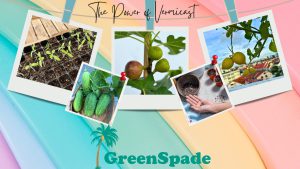Discover the amazing benefits of vermicast fertilizer and how it can naturally boost the growth of your plants, vegetables, and flowers.
Vermicast Fertilizer Explained
Vermicast fertilizer, also known as worm castings or worm compost, is a type of organic natural fertilizer that is produced through the process of vermicomposting. Vermicomposting is the process of using worms to break down organic matter, such as food scraps and plant waste, into nutrient-rich compost. The resulting vermicast is a highly beneficial fertilizer that is rich in nutrients and beneficial microorganisms.
Greenspade’s Organic Vermicast is responsibly sourced from small, ethical earthworm farms. We ensure our earthworms are fed with high quality feeds to ensure production of the best vermicast.
The key to understanding vermicast fertilizer lies in its composition. It is packed with essential nutrients like nitrogen, phosphorus, and potassium, which are vital for plant growth. Additionally, it contains beneficial microorganisms like bacteria and fungi that help improve soil structure and nutrient availability. These microorganisms also aid in suppressing diseases and pests, promoting overall plant health.
Using vermicast fertilizer in your garden is a natural and sustainable way to provide your plants with the nutrients they need to thrive.
Benefits of Using Vermicast Fertilizer
There are numerous benefits to using vermicast fertilizer in your garden. Firstly, vermicast is rich in nutrients that are readily available to plants. This means that plants can quickly absorb and utilize these nutrients, resulting in healthier and more vigorous growth.
Another benefit of vermicast fertilizer is its ability to improve soil structure. The organic matter in vermicast helps to improve soil drainage, aeration, and moisture retention. This creates an optimal environment for root growth and allows plants to access nutrients and water more effectively.
Vermicast also enhances the biological activity in the soil. The beneficial microorganisms present in vermicast help break down organic matter, release nutrients, and suppress harmful pathogens. This leads to improved soil fertility, reduced plant diseases, and increased resistance to pests.
Using vermicast fertilizer is also an environmentally friendly choice. It reduces the reliance on chemical fertilizers, which can have negative impacts on the environment and human health. Vermicast is a natural and sustainable alternative that promotes soil health and ecosystem balance.
Overall, the benefits of using vermicast fertilizer in your garden are numerous. It promotes healthy plant growth, improves soil structure, enhances soil fertility, and reduces the environmental impact of gardening.
How to Use Vermicast Fertilizer in Your Garden
Using vermicast fertilizer in your garden is easy and straightforward. Here are some steps to follow:
1. Prepare potting soil: Before applying vermicast fertilizer, prepare your soil by removing any weeds or debris. Loosen the soil to improve aeration and drainage.
2. Determine the amount: Calculate the amount of vermicast fertilizer needed based on the size of your garden and the specific requirements of your plants. A general rule of thumb is to use about 1/4 to 1/2 inch of vermicast as a top dressing around the base of plants.
3. Apply the fertilizer: Sprinkle the vermicast evenly around the base of your plants, avoiding direct contact with the stems or leaves. Gently work it into the top layer of soil with a garden fork or rake.
4. Water thoroughly: After applying the vermicast fertilizer, water your plants thoroughly to help the nutrients penetrate the soil and reach the roots.
5. Repeat as needed: Depending on the needs of your plants, you can repeat the application of vermicast fertilizer every 4-6 weeks or as recommended.
By following these simple steps, you can effectively incorporate vermicast fertilizer into your gardening routine and reap the benefits of healthy and thriving plants.
Vermicast Fertilizer vs. Chemical Fertilizers
When it comes to choosing a fertilizer for your garden, there are several factors to consider. One of the main considerations is the impact on the environment and human health.
Chemical fertilizers, although effective in providing nutrients to plants, often come with negative consequences. They can leach into groundwater, pollute water bodies, and harm beneficial organisms in the soil. Additionally, the overuse of chemical fertilizers can lead to nutrient imbalances, soil degradation, and reduced plant resilience.
On the other hand, vermicast fertilizer offers a natural and sustainable alternative. It enriches the soil with organic matter, improves soil structure, and promotes the growth of beneficial microorganisms. Vermicast is also less likely to cause nutrient leaching or environmental pollution.
Another advantage of vermicast fertilizer is its slow-release nature. Unlike chemical fertilizers that provide an immediate nutrient boost, vermicast releases nutrients slowly over time. This ensures a steady and continuous supply of nutrients to plants, reducing the risk of nutrient imbalances and promoting healthier growth.
In summary, vermicast fertilizer is a more environmentally friendly and sustainable choice compared to chemical fertilizers. It promotes soil health, reduces pollution, and supports the long-term productivity of your garden.
Success Stories: Real-life Results with Vermicast Fertilizer 
Many gardeners have experienced great success using vermicast fertilizer in their gardens. Here are some real-life stories showcasing the positive results of using vermicast:
1. Increased plant growth: Gardeners have reported significant improvements in plant growth, with plants growing larger, greener, and producing more flowers or fruits. The rich nutrients and beneficial microorganisms in vermicast contribute to these remarkable results.
2. Healthier plants: Plants treated with vermicast fertilizer are often more resistant to diseases and pests. The enhanced soil fertility and microbial activity help boost plant immunity, leading to healthier and more resilient plants.
3. Improved soil quality: Over time, the use of vermicast fertilizer can transform the soil, making it more fertile, well-structured, and moisture-retentive. This creates an ideal growing environment for plants and supports long-term garden sustainability.
These success stories are a testament to the effectiveness of vermicast fertilizer and its ability to naturally enhance plant growth and overall garden health.




